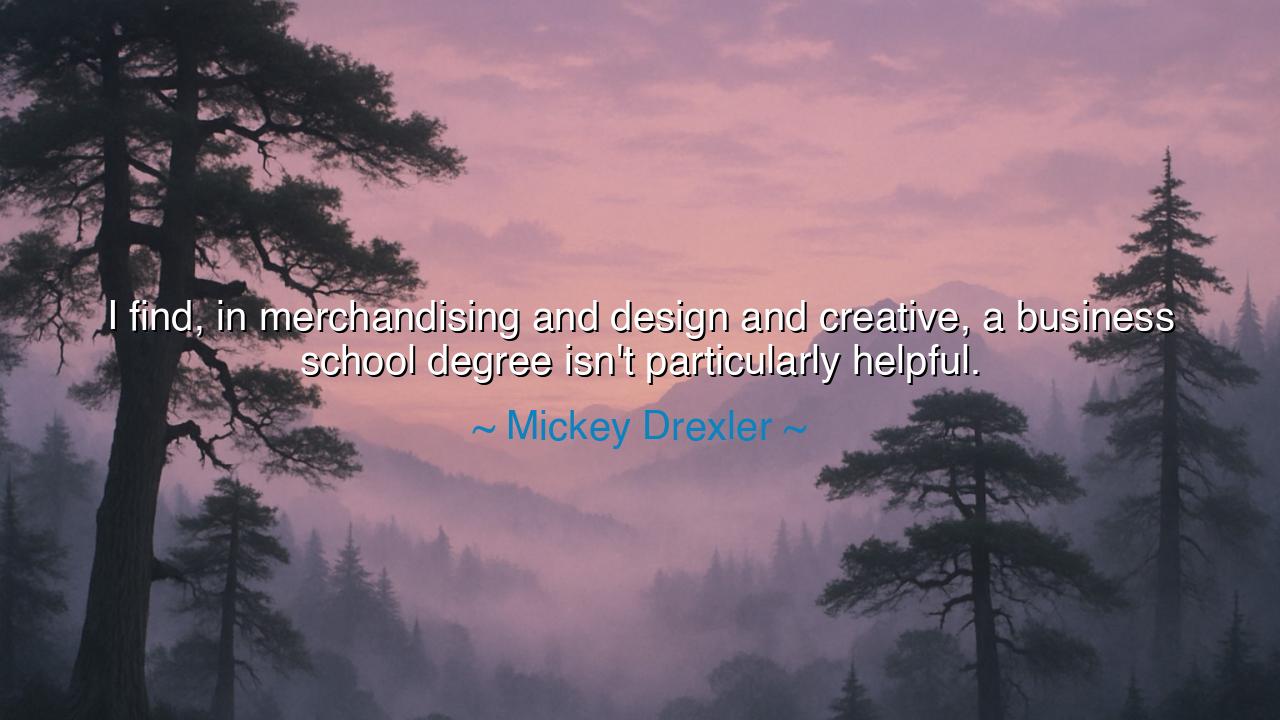
I find, in merchandising and design and creative, a business
I find, in merchandising and design and creative, a business school degree isn't particularly helpful.






In the bustling world of commerce and creation, where art meets ambition and instinct wrestles with intellect, Mickey Drexler, the “merchant prince” of modern fashion, once spoke with disarming honesty: “I find, in merchandising and design and creative, a business school degree isn’t particularly helpful.” To the ear of the uninitiated, it may sound like defiance of education; but to the ear of wisdom, it is a hymn to intuition, experience, and the living art of creation. Drexler, who guided brands such as Gap, Old Navy, and J.Crew into cultural empires, was not scorning knowledge—he was reminding the world that true understanding cannot be taught in a classroom, for creativity is not born of calculation, but of vision.
In the ancient days, when the craftsman was both artist and merchant, the masters of their trade learned not from books, but from the rhythm of the marketplace, from the touch of material, from the pulse of the people. The sculptor knew the soul of marble; the tailor, the personality of every thread. So too does Drexler stand in that long lineage of creators who listen not to theory, but to the truth of human experience. For in the realm of design and merchandising, the mind alone is not enough—one must possess the eye that sees beauty, the heart that senses need, and the instinct that anticipates desire. These things no degree can bestow; they are the gifts of time, passion, and attention.
The origin of this quote lies in Drexler’s reflections on his own journey through the corridors of retail. He began not as a scholar of markets, but as a student of people. His lessons came from the floor of the store, not the lecture hall; from watching how a customer’s hand lingers on a fabric, how color moves emotion, how price whispers or shouts. He once said that great merchants are those who “live inside their business,” who can feel when something is right before they can prove it with data. To him, the business school teaches the rules, but creativity breaks them, and it is often in that breaking that greatness is born.
Consider the story of Steve Jobs, a kindred spirit of Drexler and one of his close collaborators. Jobs, who famously dropped out of college, found inspiration not in commerce textbooks, but in a calligraphy class—a class that would later shape the elegant typography of Apple’s products. When asked about the secret of innovation, Jobs echoed Drexler’s wisdom: “It’s not about market research—it’s about intuition.” Both men understood that creativity lives in the space between logic and wonder, and that too much structure can suffocate the soul of invention. The world’s greatest creations—be they cathedrals, symphonies, or brands—are born not from equations, but from vision touched by courage.
Drexler’s words, however, carry not contempt for education, but a call for balance. He does not reject learning; he redefines it. The business school may teach the mechanics of profit, but it cannot teach the mystery of taste, nor the alchemy of inspiration. Numbers can measure what has been done, but not what should be done. For the creative spirit must dare to leap into the unknown, guided not by charts, but by conviction. The wise merchant listens to the whispers of culture, feels the winds of change, and dares to shape desire before the world even knows it wants something. This, Drexler suggests, is the art that no diploma can confer.
The ancients told of the artisan and the philosopher—two who sought truth in different ways. The philosopher dissected life with logic; the artisan breathed it into form. Yet both were seekers of meaning. Drexler reminds us that in our age, dominated by analytics and algorithms, we must not forget the artisan’s way: to feel before knowing, to create before counting. For even in business, creation is an act of faith, and faith requires risk, intuition, and heart.
So let this be your lesson, O seeker of mastery: education is the seed, but experience is the soil. Learn what you can from the books, but then step boldly into the world and learn from its heartbeat. Do not mistake credentials for wisdom, nor process for purpose. Whether you design garments, build cities, or lead enterprises, remember Drexler’s truth—that success in the creative realm belongs not to those who study it from afar, but to those who live it fully. For only those who trust their instinct, honor their craft, and see beauty where others see only numbers, will shape the future not as merchants, but as makers of meaning.






AAdministratorAdministrator
Welcome, honored guests. Please leave a comment, we will respond soon